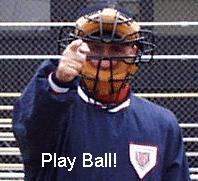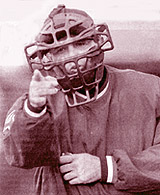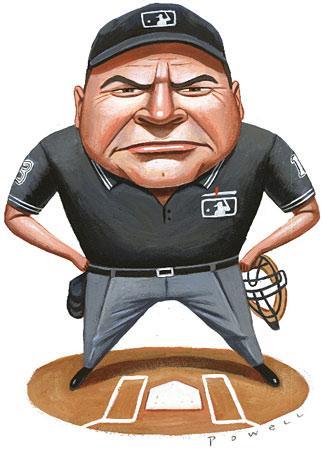
Bat
Hitting Ball Second Time
QUESTION:
Ruling on bat hitting ball second time. Batter hits
ball and drops bat in fair territory and ball strikes
bat second time. Is that dead ball b-r out? Other
runners can not advance?
ANSWER:
1. If the bat is out of the batter's hands, dropped
or thrown, and it hits the ball a second time in fair
territory, the ball is dead and the batter runner
is out.
2. However, if the BALL hits the bat on the ground,
the batter is not out and the umpire must then
determine whether the ball is fair or foul based on
the fair / foul rule.
3. If the ball rolls against the bat in fair territory,
the ball remains live.
4. If the ball stops or is touched in fair territory,
it is a fair ball.
5. If the ball touches the bat in fair territory and
then rolls to foul ground and stops, it is a foul
ball.
6. If the ball rolls against the bat in foul territory,
it is a foul ball.
RULE 6.05
A batter is out when -- (h) After hitting or bunting
a fair ball, his bat hits the ball a second time in
fair territory. The ball is dead and no runners may
advance. If the batter-runner drops his bat and the
ball rolls against the bat in fair territory and,
in the umpire's judgment, there was no intention to
interfere with the course of the ball, the ball is
alive and in play;
SanFilippo:
Youth sports no longer about the kids
Anthony J. SanFilippo
Just finished coaching youth baseball for the summer,
as has been the case for the past six years. However,
this year the coaching foray stretched into late July
and tournament baseball. It was a new experience from
a coaching perspective. Last year, it was just cheering
from the bleachers as the local 11-year old team reached
the state tournament with my kid serving as a role
player. This year was different. It was eye-opening.
And frankly, what was witnessed was pretty darn embarrassing.
First, let it be stated that tournament team baseball
has simply taken over in every suburban community
near and far. Whether it's Little League, Babe Ruth
or the younger arm of the Bambino known as Cal Ripken
Baseball, everything is geared toward the development
of tournament teams. House leagues, which mostly everyone
who grew up prior to this era participated in, are
not important, except as cash cows for the athletic
organizations that offer them and often end the same
week as school.
This means, for 90 percent of the ball-playing youths,
America's pastime, which is synonymous with summer,
is over before the solstice even arrives. That's a
shame. But, in defense of the house league organizers,
it's somewhat understandable. Parents are more interested
in going to the shore or enrolling their children
in summer camps than they are with continuing baseball
as an activity into the summer. With rosters being
smaller in number (to assure every kid playing time),
the gamble of forfeiting games because of other activities
are too great to risk keeping these leagues running
very long past the final school bell. But what of
the 30 or so kids in each age group that really want
to keep playing? There has to be something for them,
right? Well, that's where tournament ball comes into
play. And that's fine. There are now tournaments for
kids as young as 8 and as old as 18. The premise of
these tournaments is to allow the kids who want to
continue playing the chance to do so, which is definitely
a positive.
So, each athletic association, whether it's the Brandywine
Youth Club, or the Ridley Athletic Association, or
Drexel Hill Little League, or whoever, creates a team
of kids to play tourney ball, usually through some
sort of tryout. If there are enough kids left over,
a second squad, or "B" team is formed. There
are plenty of tournaments for all to participate in,
including the kids in the "B" program. While
this all sounds hunky-dory, it's really not. That's
because when it gets to this point, for the most part,
the organizers, or coaches, or both, and yes most
of them are parents of kids on these teams, suddenly
take it too far. It becomes more about winning for
community pride, and making themselves look good -
as if they are going to be hired by a major league
team at summer's end - than it is about teaching the
kids to play the game the right way.
At a recent "B" tournament, I was talking
to an opposing coach during warmups. He said that
his organization held tryouts every year for the tournament
team for four years running, and every year, the same
12 kids were chosen to be on the team, no matter how
many kids tried out. "It's so political in our
town," the coach said. "As a parent, you're
either part of the in-crowd or you're not. It has
nothing to do with your kid, it's all about who the
parents are, who they know, and what part they're
willing to play." At the same aforementioned
tournament, while speaking to another coach, it was
divulged that one of the 10 participating coaches
loaded his roster with 20 names, which is a lot for
one team.
After nearly losing to a team he felt he should have
obliterated, the coach called on kids who played for
that organization's "A squad." He was handing
out jerseys to these kids minutes before the next
game. Suffice it to say, they dominated. In my team's
final game, while coaching first base, two of the
coaches from the opposing team were talking to my
left. One pointed out a kid sitting in the stands
who played for their squad a season earlier. One coach
walked over to the kid and said, "What are you
doing this weekend?" "Nothing, why,"
the youth replied. "I could really use you for
our semifinals and finals," said the coach. "But,
I'm too old, and I'm not on your roster," said
the dumbfounded child. "Don't worry," said
the coach with a snicker. "I'll take care of
that." Unfortunately, this shouldn't surprise,
because it happens far too often. And not just in
baseball, but in other sports too.
It's all about their shallow and fleeting individual
glory, and not about the kids themselves who are participating,
and supposedly growing within the game. As watchdogs,
we in the media are quick to point out character flaws
and things like drug abuse and steroid use by players
as a way of both reporting news, but also sending
a message to those impressionable in society that
this behavior is wrong.
But, what good is it when children are learning from
their parents and coaches that cheating is acceptable?
Yet, nothing can be done. As long as the competition
remains more about the adults involved in youth sports
than the ones actually playing the games, it will
remain this despicable, if not worse.
Schiele's
Slant: The umpire strikes back
You're
blind as a bat! You stink! Get a clue!
Welcome to the world of being a Little
League baseball umpire. It is a thankless job.
One where, while kids are having fun on the field,
adults in the stands sometimes are the ones acting
like children. We've all seen it. Or heard it. The
loudmouth with the booming voice expressing his displeasure
over a call. The mom shrieking after her son got called
out looking at strike three. Heckling an umpire dates
back to shortly after Abner Doubleday penned the rules
of the game. In most cases, the catcalls and cackles
are harmless banter.
Just a chance to poke fun at the men
in blue. But after chatting with various local Little
League umpires, all agree there are times when parents
go over the line. Not often, mind you, but when the
line is crossed, things sometimes can turn ugly. "It
doesn't happen a lot," said umpire Frank Giunta, a
veteran of seven-plus years behind the plate. "I'd
say it's less than one percent. Most of the time the
parents act like they're supposed to. After the game
they thank you and appreciate what you do." The umpires
admit they've missed some call over the years. And
they don't mind dealing with coaches and managers
over such matters.
But when the parents get involved, that's
a different story. "I understand people are competitive
and they want their kids to do well," umpire Brian
Nardelli, a 10-year veteran, said. "That's why I try
and ignore that stuff and don't pay attention. To
me, it's not about the parents. It's about the kids
and I try to keep it there. "Unfortunately, there's
always one that causes a stir now and then, it's rare,
but it happens. I've seen fans get thrown out. I even
saw one get so mad he threw his lawn chair." Hey ump,
we know you're blind, we've seen your wife. You couldn't
call a cab. LensCrafters called, your glasses will
be ready in 10 minutes.
Umpire Tim Sugalski, who has been calling
games for about four years, understands the heat-of-the-moment
times when parents go off. But, he said, they have
to learn to let it go. "The crazy things is when they
harp on one close call," Sugalski said. "They never
let it go the entire game, and after it. "They think
you are being unfair, but you're out here doing the
best you can. It's not like I'm being paid more by
one team or the other. It's not like I have a team
I want to see win. I'm here to call the game and see
the kids have fun." Pat Allman, who has been umpiring
games for 22 seasons, has tossed out his fair share
of fans over the years. He even gave the thumb to
a mascot once. Yes, a mascot. More on that later.
"When it comes to language, there is
no warning," Allman said. "You hook them right away.
You know the words I mean. There's no place for that
at all, especially around kids. "If they are loud
(but not cursing) and far away I'll warn them. If
they are close, like behind the backstop and act like
a commentator, commenting on everything, I'll usually
wait to between innings, get a drink of water and
quietly tell them they can watch the game from here
or from the parking lot. The results are usually pretty
good." Hey ump, this cell phone must be yours. It
has three missed calls. Wake up ump, you're missing
a great game. I've seen potatoes with better eyes.
Giunta finds it amazing that some of the biggest umpire
baiters are people that have no clue about the game.
"It's mostly a lack of knowledge by parents who don't
know what they are talking out, he said. "They don't
know the rules and they voice their opinions without
an education. "You would think parents would set an
example for the kids. The kids, sometimes you call
them out, they maybe make a face or something, then
walk away. The parents, they just continue to go on
and on about it. It's funny, the parents sometimes
act like a child more than the kids do themselves."
Allman said in most cases, the parents that go over
the edge are not one-time offenders.
"Usually, when a person is a troublemaker
at a game, they don't save it for just baseball. It's
every sport, every year. The parents know who the
bad apples are. "There have been times I've warned
people, or hooked people, and when the game was over,
a parent from that same team will come up to me and
will tell me they were glad I did that. That he's
been doing it all year." Hey Blue, did your glass
eye fog up? Can I pet your seeing-eye dog after the
game? I thought only horses slept standing up. As
for worst-case scenarios, thankfully none of the umpires
had physical altercations. One talked about having
his cellphone in hand, 9-1-1 dialed in and ready to
hit send after his car was surrounded by angry parents
that eventually walked away. Another told a story
of an angry parent being physically restrained by
other bystanders as the ump sprinted to his car. The
best of the bunch was about an incensed parent, after
a call at home to end the game, jumping over the outfield
fence and running to confront the ump at the plate.
How did it end? "He was arrested for public intoxication,"
the umpire said with a laugh. As for the mascot ejection
story, Allman explained it this way. He was living
in the state of Washington, calling a district playoff
game where fans, parents and mascots were not allowed
to coach the kids during tournament games.
"The guy had been drinking," Allman
said. "The mascot was a guy in a gorilla suit. Hey,
I drink, and I can tell he had been drinking, even
if he's wearing a gorilla suit. He kept coaching the
kids, even after I told him to stop several times.
I told him, mascots are supposed to cheer, not coach.
"He doesn't stop, so finally I hook him. I ran the
mascot. And by rule, he had to leave the field. Next
thing I know, I see him, still in his gorilla suit,
head and all, driving off down the road in an open
Jeep. Meanwhile, I'm thinking to myself, I just ran
a gorilla." Back on a serious note, Allman has advice
for parents. Having seen thousands of games, he speaks
from experience. "The parents are supposed to be here
to cheer," he said. "That's what I tell them, it's
your job to cheer, my job to umpire, the coach's job
to coach and for the kids, it's their job to play
and have fun. It's as simple as that."


T.RICOUNTY
U.MPIRE
G.ROUP
has adopted
a NO TOLERANCE POLICY
regarding abuse of umpires.
SPECTATORS:
The umpires should not speak to abusive spectators
- the umpire will notify the manager and the policy
will be enforced as follows:
1: The first warning will be given to the offending
team's manager.
2: The second warning will be given to the offending
team's manager.
3: If a third warning must be issued, the offending
team will forfeit the game.
NOTE: The following rule
applies to Little League Only!
9.01 (f) Umpires may order
both teams into their dugouts and suspend play until
such time as League Officials deal with unruly
spectators. Failure of League Officials
to adequately handle an unruly spectator can result
in the game remaining suspended until a later date.
ON-FIELD PERSONNEL:
The above policy does not imply that players, coaches
and managers must be warned before ejection from a
game. The following offenses may result in immediate
ejection from the game:
1: Profanity or obscene language.
2: Physical or verbal assault on an umpire.
3: Throwing hats or other equipment on the field.
4: Arguing balls and strikes or other judgment calls.
The umpire will handle individual situations with
on-field personnel, as he feels necessary. He may
warn a coach or manager or send him to the bench as
alternatives to ejection from the game. These decisions
are like all other judgment calls - they cannot be
protested and will not be changed.
If a player, coach or manager is ejected from the
game, he will be required to leave the area immediately.
Managers and Coaches: Please keep your players and
spectators under control. Be respectful of the umpires
- they are human, just like everyone else on the field.
If you have a question about a ruling, ask the umpire
for time and then discuss the situation. Remember
that judgment calls cannot be protested and will not
be changed.
Remember that our goals are to teach our players sportsmanship
and control of their emotions on the field. Teaching
by example is the best method to instill these qualities
in our players.

Please contact the UMPIRE-IN-CHIEF
if you think that an umpire has made an incorrect
ruling or is doing a poor job on the field.
Poise
- A Life's Lesson
As a member of the board
of directors of our town's youth baseball program
I am often asked for advice by new coaches and managers
when they enter our league. One of the most common
questions is "There is so much to teach…what
skills are the most important? What should I teach
first?" Without hesitation my response to that
query is one word: "poise."
Expecting to hear something more like base-running,
bunting, or sliding, I often will get a surprised
look and then the follow up question, "What do
you mean poise?" This is what I mean:
Poise means composure, the ability to maintain a good
attitude and not let the disappointments of the game
drive one's behavior. Keeping your cool. In a game
where even the best players are unsuccessful two out
three trips to the plate, keeping one's poise can
get you through the day.
Since many managers see their players' failures as
their own, the manager must make poise his number
one behavior trait as well. Poise is the example you
have to set for your players to emulate. Sometimes
the disappointments of the game are connected to the
rulings of the umpire. So let's go there for minute.
If you've ever thought, "That umpire cost us
the game." You're fooling yourself. What about
your players that got put out during the game? At
least 18 batters or runners had to make an out during
every game! Perhaps some of those outs could have
been hits that might have scored more runs? Maybe
some of those outs cost your team the game. If an
umpire's call was, in your judgment, incorrect and
it benefited the other side, chances are good that
the same umpire made other incorrect calls during
the game or the season that benefited your side too.
If you're going to complain about bad calls that go
against your team, are you prepared to go out and
propose that a bad call that helps your team be reversed
as well? I don't think so. So, in effect, complaining
about a call you don't agree with is hypocritical.
If you're going to silently accept the benefits of
an incorrect call that favors your side, you have
to accept the questionable calls that hurt your team
with as much calm composure and nary a protest.
What you have to recognize is that any amateur umpire
is very much like yourself. He's out there because
he loves the game and wants to do his part to help
kids have fun playing it. Fairly and by the rules.
Like you, he's not an expert and he's not a professional.
He doing his best and he has no desire to favor either
side. He only wants to make the best ruling he can
at the time he sees the play. His decisions are final.
So why argue them?
Why would one deliberately to be rude and disrespectful
to the one person one the field your team really needs
support from? The umpire is a human being just like
you and the more abuse that is directed at him, the
more distracted he will become. You know it's hard
to think clearly when you're the target of harangues
from players, coaches or spectators. Allowing this
situation will unfortunately cause the distracted
umpire to become even more likely miss another play
or mistake another ruling.
Your objective as coach is simply to win the game,
which usually includes some playing and mental errors.
But you can still win despite those errors. Remember,
the umpire's objective is to go out there and get
every play right. No errors! When an umpire makes
a bad call he usually knows it and feels just as bad
about it as you do. If you lose your poise and blast
the umpire for a call you don't like, think: are you
making the umpire the scapegoat for your strategy
failures, or your team's failures? If that's the case,
you fail as a coach and you're making it harder for
the umpire to do his job well. Help your players to
learn to play better instead making excuses for their
poor play by blaming the umpire.
No doubt a bad call will cost you an occasional run,
or hand your team an undeserved out. However, one
of the most important lessons you can teach your player's
is that you'll never agree with every call the umpire
makes. Baseball is officiated by humans who are not
perfect. It has always been like that and it always
will be. Learning to live with an occasional bad call
is as much a part of learning to play this game as
learning to hit the ball. The sooner your players
accept that, the more successful players they'll be.
Have you ever seen a player or manager just completely
lose control and end up getting ejected over what
was a bad call? It happens. Part of being successful
is the ability to keep your poise and stay in the
game, literally!
I have seen innings where a defense had given away
five or six outs to the other team by their poor play:
dropping balls, making wild throws and committing
mental errors. Then when a close "banger"
at first base doesn't go his team's way, the coach
hollers, "Get in the game, Blue!"
I continually notice that the most successful players
never react to an umpire's decision that goes against
them. They always maintain their poise. No matter
how incorrect an umpire's decision seems at the time,
they calmly dust themselves off and get back in the
game without comment or complaint. These successful
players know that this time it didn't go their way.
However, next time it might, and sooner or later it
will. They know the law of averages will keep it fair
and things will eventually even out. Successful players
know that as long as they keep their poise they're
going to continue to enjoy the game.
We often hear that participation in youth sports is
a valuable experience that helps prepare children
for the competitions and conflicts of life. As a coach
participating in this valuable experience what could
be a more important life's lesson than teaching poise?
Probably none of your players will ever advance to
become a professional baseball player. As a working
adult, it's been a long time since I was told to get
my mitt and go in to cover first base, or to get a
bat and try to bunt the runners up a base.
However, as adults
we all deal with adverse and difficult decisions made
by others that effect us every day. From the assignments
that our bosses hand us to the traffic ticket the
policeman hands us. Learning how to handle those disappointments
in a mature and dignified manner is the same lesson
you as a baseball coach can teach right now! Keep
your poise


